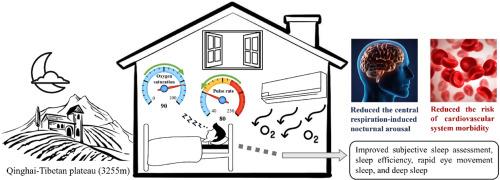A longitudinal study on the effects of oxygenation on sleep in Tibetan plateau residents
IF 3.8
2区 医学
Q1 CLINICAL NEUROLOGY
引用次数: 0
Abstract
Objective
The decline in sleep quality induced by hypoxia is the main environmental exposure risk affecting the physiological health of high-altitude residents. The long-term effects of oxygen therapy on the sleep quality and health of highlanders remain unclear. This study aims to evaluate the impact of chronic oxygen therapy on sleep and health, providing a scientific basis for the establishment of regional centralized oxygen supply and the implementation of health regulations to improve sleep quality and health in plateau areas.
Methods
Conducted over a span of three years at an altitude of 3255 m in the Tibetan Plateau, this study included 317 participants and meticulously recorded sleep data for 1398 nights. The generalized estimation equation was used to analyze the impact of oxygen supply on sleep quality, physiological parameters, and indoor environment.
Results
The research found that long-term oxygen therapy significantly reduced the pulse rate of highland residents, increased their blood oxygen saturation, and consequently decreased their risk of cardiovascular disease. Oxygen-enriched environments improved the sleep quality of highland dwellers, significantly increasing their sleep efficiency, duration of rapid eye movement sleep and deep sleep, and subjective sleep quality evaluation, while also significantly reducing central sleep apnea-induced nighttime awakening events.
Conclusions
Long-term chronic oxygen therapy is beneficial to highland residents in terms of sleep respiratory rhythm, sleep quality, and cardiovascular function. It is imperative for both the local inhabitants of high-altitude areas and the local health authorities to be aware of the risks of hypoxia and the health benefits of oxygen therapy.

西藏高原居民缺氧对睡眠影响的纵向研究。
目的缺氧导致的睡眠质量下降是影响高海拔地区居民生理健康的主要环境暴露风险。氧疗对高原居民睡眠质量和健康的长期影响尚不清楚。本研究旨在评估长期氧疗对睡眠和健康的影响,为高原地区建立区域性集中供氧和实施改善睡眠质量和健康的卫生法规提供科学依据:本研究在海拔 3255 米的青藏高原进行,历时三年,共 317 人参加,详细记录了 1398 个夜晚的睡眠数据。研究采用广义估计方程分析供氧对睡眠质量、生理参数和室内环境的影响:研究发现,长期氧疗能明显降低高原居民的脉搏,提高血氧饱和度,从而降低心血管疾病的风险。富氧环境改善了高原居民的睡眠质量,显著提高了他们的睡眠效率、快速眼动睡眠和深度睡眠持续时间以及主观睡眠质量评价,同时还显著减少了中枢性睡眠呼吸暂停引起的夜间觉醒事件:结论:长期慢性氧疗对高原居民的睡眠呼吸节律、睡眠质量和心血管功能有益。高海拔地区的当地居民和当地卫生部门都必须认识到缺氧的风险和氧疗对健康的益处。
本文章由计算机程序翻译,如有差异,请以英文原文为准。
求助全文
约1分钟内获得全文
求助全文
来源期刊

Sleep medicine
医学-临床神经学
CiteScore
8.40
自引率
6.20%
发文量
1060
审稿时长
49 days
期刊介绍:
Sleep Medicine aims to be a journal no one involved in clinical sleep medicine can do without.
A journal primarily focussing on the human aspects of sleep, integrating the various disciplines that are involved in sleep medicine: neurology, clinical neurophysiology, internal medicine (particularly pulmonology and cardiology), psychology, psychiatry, sleep technology, pediatrics, neurosurgery, otorhinolaryngology, and dentistry.
The journal publishes the following types of articles: Reviews (also intended as a way to bridge the gap between basic sleep research and clinical relevance); Original Research Articles; Full-length articles; Brief communications; Controversies; Case reports; Letters to the Editor; Journal search and commentaries; Book reviews; Meeting announcements; Listing of relevant organisations plus web sites.
 求助内容:
求助内容: 应助结果提醒方式:
应助结果提醒方式:


